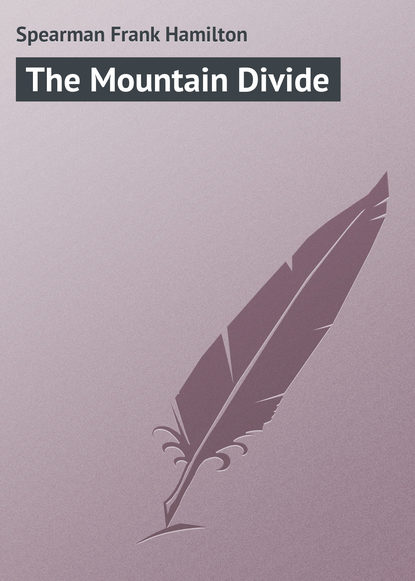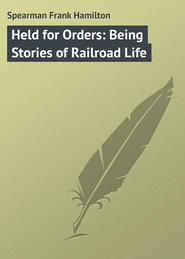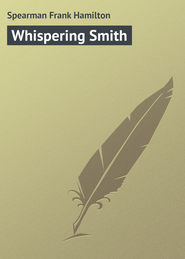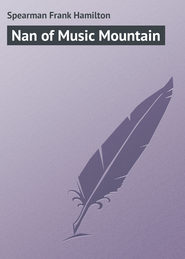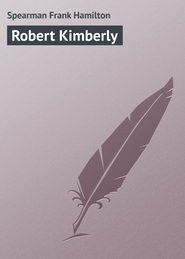По всем вопросам обращайтесь на: info@litportal.ru
(©) 2003-2024.
✖
The Mountain Divide
Автор
Год написания книги
2017
Настройки чтения
Размер шрифта
Высота строк
Поля
The echoes of the report crashed back to the rocks, but brought nothing from the silence of the emigrant wagon. A second shot followed, tearing through the side board of the wagon-box itself; yet there was no answer. Scott, taking his horse, while Hawk remained in hiding and covered the scene with his own rifle, led the horse so that it served as a shelter and walked directly toward the wagon itself. As he neared it he approached from the front, pausing at times to survey what he saw. Hawk watched him lead his unwilling horse, trembling with fear, up to the dead team as they lay in the bright sunlight, and saw Scott take hold of the protruding boot, peer above it into the wagon itself and, without turning his head, beckon Hawk to come up.
Under the canvas, the driver of the wagon lay dead with the lines clutched in his stiffened fingers, just as he had fallen when death struck his horses. The two frontiersmen needed no explanation of what they saw in the scarred and blackened face of the outlaw. A bolt of lightning had killed him and stricken both horses in the same instant. Bob crawled into the wagon and with Hawk’s help dragged the dead man forward into the sunlight. Both recognized him. It was Bucks’s assailant and enemy, the Medicine Bend and Spider Water gambler, Perry.
CHAPTER XVIII
The two men, aided by the crew of the train that now came down the Bitter Creek grade, got the dead body of the outlaw back to Point of Rocks just as a mixed train from the east reached there, with Stanley and a detail of cavalry aboard. Stanley walked straight to Bucks, caught him by the shoulders, and shook him as if to make sure he was all right.
“Gave you a warm reception, did they, Bucks?”
“Moderately warm, colonel.”
Stanley shook his head. “It is all wrong. They never should have sent you out here alone,” he declared brusquely. “These superintendents seem to think they are railroading in Ohio instead of the Rocky Mountains. Dave,” he continued, turning to Hawk as the latter came up, “I hear you have just brought in Perry dead. What have we got here, anyway?”
“Some of the Medicine Bend gang,” returned Hawk tersely.
“What are they doing?”
“Evening up old scores, I guess.”
Stanley looked at the dead man as they laid him out on the platform: “And hastening their own day of reckoning,” he said. “There shall be no more of this if we have to drive every man of the gang out of the country. Who do you think was with Perry, Bob?” he demanded, questioning Scott.
“There is nothing to show that till we get them–and we ought to be after them now,” returned the scout. “But,” he added softly as he hitched his trousers, “I think one of the two might be young John Rebstock.”
“You need lose no time, Bob. Here are ten men with fresh horses at your orders.” Stanley pointed to the troopers who were unloading their mounts.
“Give Dave and me three of the best of these men,” said Scott. “I will follow the west trail. Put a sergeant with the others on the trail east to make sure they haven’t doubled back on us–but I don’t think they have.”
“Why?”
“They must have stolen that team and wagon, that is certain. More than likely they murdered the man they took it from. The trail is probably alive with men looking for them. These fellows were trying to get to Casement’s camp for gambling, and probably they are heading that way fast now. We will pick those fellows up, colonel, somewhere between here and Bridger’s Gap.”
The three troopers that Scott selected were told off and, after a few rapid arrangements for sending back information, the five men of the west-trail party, headed by Scott and Dave Hawk, rode down Bitter Creek and, scattering in a wide skirmish line wherever the formation of the country permitted, scanned the ground for signs of the fugitives.
“We shan’t find anything till we get to where they were when the rain stopped,” Scott told the trooper near whom he was riding. It was, in fact, nearly ten miles from Point of Rocks before they picked up the footprints of two men travelling apart from each other, but headed north and west. These they followed on a long détour away from the regular wagon road until the two trails turned and entered, from the southwest, a camp made the night before by a big trading outfit on the regular overland trail.
Here, of course, all trace of the men disappeared. It was now drawing toward evening. Scott resolved to follow the trading outfit, but the party still rode slowly to make sure the men they wanted did not sneak away from the wagons of their new-found friends. The pursuers rode steadily on, and as the sun went down they perceived in a small canyon ahead of them the wagons of the outfit they were trailing, parked in a camp for the night.
Scott gave the troopers directions as to where to post themselves, at some distance east and west of the canyon, to provide against a sortie of the fugitives and, riding with Hawk directly into the camp, asked for the boss. He appeared after some delay and proved to be a French trader with supplies for Salt Lake.
Hawk, whose long visage and keen eyes gave him a particularly stern air–and David Hawk was never very communicative or very warm-mannered–asked the questions. The Frenchman was civil, but denied having any men with him except those he had brought from the Missouri River. However, he offered to line up his men for the railroad party to look over. To this Hawk agreed, and, when the word had been passed, the entire force of the trader were assembled in front of the head wagon.
Scott rode slowly up the line scrutinizing each face, and, turning again, rode down the line. Once he stopped and questioned a suspicious-looking teamster wearing a hat that answered Bucks’s description, but the man’s answers were satisfactory.
When Scott had finished his inspection the men started to disband. Hawk stopped them. “Stay where you are,” he called out curtly. Turning to the Frenchman, he added: “We will have to search your wagons.”
Again the trader made no objection, though some of his men did.
The three troopers were signalled in, and posted so there could be no dodging from one wagon to another, and Hawk gave them orders, loud enough for all to hear, to shoot on sight any one leaving the wagons. And while he himself kept command of the whole situation, Scott dismounted and accompanied by the trader began the search. The hunt was tedious and the teamsters murmured at the delay to their camp work. But the search went forward unrelentingly. Not a corner capable of concealing a dog was overlooked by the painstaking Indian and not until he had reached the last wagon was his hope exhausted.
This wagon stood at the extreme end of a wash-out in the side of the canyon itself. It was filled with bales of coarse red blankets, but no man was to be found among them.
Scott did find something, however, in a sort of a nest fashioned among the bales near the middle of the wagon. What would have escaped an eye less trained to look for trifles attracted his at once. It was a dingy metal tag. Scott picked it up. It bore the name of a Medicine Bend saloon and the heads of three horses, from the design of which the saloon itself took a widely known and ill name. He laid his hand on the blanket from which he had picked the tag. The wool was still warm.
Scott only smiled to himself. Both ends of the little canyon were guarded. From where he was searching the scout peered carefully out at the canyon walls. There were hiding-places, but they were hardly large enough to conceal a man. It was somewhere in the rocks close at hand that the fugitives had found a temporary refuge; but they could not now escape–nor could they be far from the wagon.
Without losing sight of the surroundings, Scott, disclosing nothing of his discovery to the trader, announced that he was satisfied and that the men he wanted did not appear to be there. He added, however, that if the Frenchman had no objection his party would pitch camp close by and ride with him in the morning. The Frenchman maintained his courtesy by inviting the party to take supper with him, and Scott, agreeing to return, rode away with Hawk and the three troopers.
They had not ridden far, when Bob dismounted the party and leaving the horses with one trooper set two as pickets and posted himself in hiding on one side the canyon, with Hawk on the other, to watch the camp. What he saw or whether his patience was in any degree rewarded no one could have told from his inscrutable face as he walked into the camp at dusk and sat down with the trader to supper. The moon was just rising and down at the creek, a little way from where Scott sat, some belated teamsters were washing their hands and faces and preparing their own supper. Scott ate slowly and with his back to the fire kept his eye on the group of men down at the creek. When he had finished, he walked down to the stream himself. A large man in the group fitted, in his hat and dress, Bucks’s exact description. Scott had already spotted him an hour before, and stepped up to him now to arrest young John Rebstock.
He laid his hand on the man’s shoulder and the man turned. But to Scott’s surprise he was not the man wanted at all. He wore Rebstock’s clothes and fitted Rebstock’s description, but he was not Rebstock. The scout understood instantly how he had been tricked, but gave no sign.
Within the preceding thirty minutes the real Rebstock, whom Scott had already marked from his hiding-place in the canyon, had traded clothes with this man and, no doubt, made good his escape.
If Bob was chagrined, he made no sign.
“You must have made a good trade,” he said, smiling at the teamster. “These clothes are a little big, but you will grow to them. How much boot did you get?”
Scott looked so slight and inoffensive that the teamster attempted insolence, and not only refused to answer questions, but threatened violence if the scout persisted in asking them. His companions crowding up encouraged him.
But numbers were not allowed for an instant to dominate the situation. Scott whipped a revolver from his belt, cocked it, and pressed it against the teamster’s side. Dave Hawk loomed up in the moonlight and, catching by the collar one after another of the men crowding around Scott, Hawk, with his right hand or his left, whirled them spinning out of his way. If a man resisted the rough treatment, Hawk unceremoniously knocked him down and, drawing his own revolver, took his stand beside his threatened companion.
Other men came running up, the trader among them. A few words explained everything and the recalcitrant teamster concluded to speak. Scott, indeed, had but little to ask: he already knew the whole story. And when the teamster, threatened with search, pulled from his pocket a roll of bank-notes which he acknowledged had been given him for concealing the two fugitives and providing them with clothes, Scott released him–only notifying the trader incidentally that the man was robbing him and had loot, taken from the ammunition wagon, concealed under his blanket bales just searched. This information led to new excitement in the camp, and the Frenchman danced up and down in his wrath as he ordered the blanket wagon searched again. But his excitement did not greatly interest Scott and his party. They went their way and camped at some distance down the creek from their stirred-up neighbors.
Hawk and Bob Scott sat in the moonlight after the troopers had gone to sleep.
“They can’t fool us very much longer,” muttered Scott, satisfied with the day’s work and taking the final disappointment philosophically, “until they can get horses they are chained to the ground in this country. There is only one place I know of where there are any horses hereabouts and that is Jack Casement’s camp.”
Hawk stretched himself out on the ground to sleep. “I’ll tell you, Dave,” continued Scott, “it is only about twenty miles from here to Casement’s, anyway. Suppose I ride over there to-night and wire Stanley we’ve got track of the fellows. By the time you pick up the trail in the morning I will be back–or I may pick it up myself between here and the railroad. You keep on as far as Brushwood Creek and I’ll join you there to-morrow by sundown.”
It was so arranged. The night was clear and with a good moon the ride was not difficult, though to a man less acquainted with the mountains it would have been a hardship. Mile after mile Scott’s hardy pony covered with no apparent effort. Bob did not urge him, and before midnight the white tents of the construction camp were visible in the moonlight. Scott went directly to the telegraph office, and after sending his message hunted up food and quarters for his beast and a sleeping-bunk for himself.
At daylight he was astir and sought breakfast before making inquiries and riding back to his party. On the edge of the camp stood a sort of restaurant, made up of a kitchen tent with a dismantled box-car body as an annex.
In this annex the food was served. It was entered from one side door, while the food was brought from the kitchen through the other side doorway of the car.
Into this crowded den Bob elbowed an unobtrusive way and seated himself in a retired corner. He faced the blind end of the car, and before him on the wall was tacked a fragment of a mirror in which he could see what was going on behind him. And without paying any apparent attention to anything that went on, nothing escaped him.
Next to where he sat, a breakfast of coffee and ham and eggs had been already served for somebody, apparently on an order previously given. At the opposite end of the car a small space was curtained off as a wash-room. Scott ordered his own breakfast and was slowly eating it when he noticed through the little mirror, and above and beyond the heads of the busy breakfasters along the serving-counter, a large man in the wash-room scrubbing his face vigorously with a towel.
Each time Scott looked up from his breakfast into the mirror the man redoubled his efforts to do a good job with the towel, hiding his face meantime well within its folds. The scout’s curiosity was mildly enough aroused to impel him to watch the diligent rubbing with some interest. He saw, too, presently that the man was stealing glances out of his towel at him and yet between times intently rubbing his face.
This seemed odd, and Scott, now eying the man more carefully, noted his nervousness and wondered at it. However, he continued to enjoy his own meal. The waiter who had served him, hurried and impatient, also noticed the waiting breakfast untouched and called sharply to the man in the wash-room that his ham was served and, with scant regard for fine words, bade him come eat it.
This urgent invitation only added to the ill-concealed embarrassment of the stalling guest; but it interested the scout even more in the developing situation. Scott finished his breakfast and gave himself entirely over to watching in a lazy way the man who was making so elaborate a toilet.
There was no escape from either end of the car. That could be managed only through the side doors, which were too close to Scott to be available, and the scout, now fairly well enlightened and prepared, merely awaited developments. He wanted to see the man come to his breakfast, and the man in the wash-room, combing his hair with vigor and peering anxiously through his own scrap of a mirror at Bob Scott, wanted to see the scout finish his coffee and leave the car. Scott, however, pounding ostentatiously on the table, called for a second cup of coffee and sipped it with apparent satisfaction. It was a game of cat and mouse–with the mouse, in this instance, bigger than the cat, but as shy and reluctant to move as any mouse could be in a cat’s presence. Scott waited until he thought the embarrassed man would have brushed the hair all out of his head, and at last, in spite of himself, laughed. As he did so, he turned half-way around on his stool and lifted his finger.
“Come, Rebstock,” he smiled, calling to the fugitive. “Your breakfast is getting cold.”





